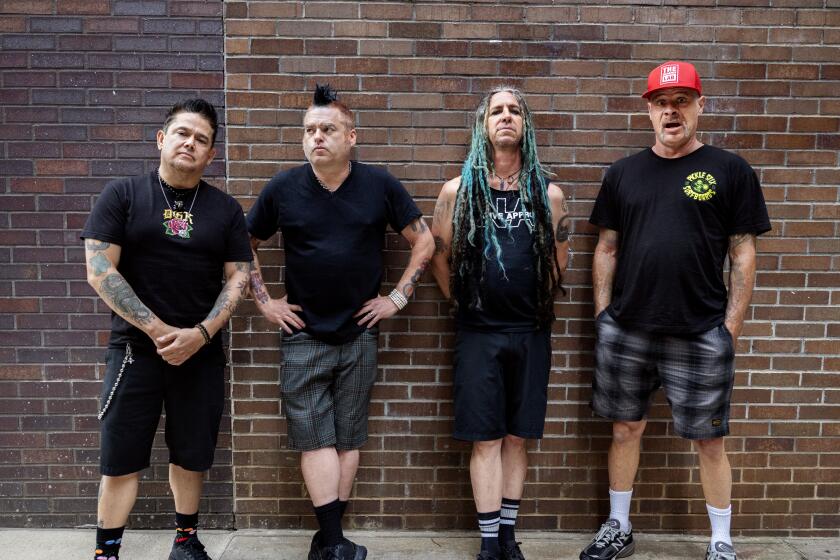SKAGGS IS ON THE INSIDE LOOKING OUT : RICKY SKAGGS IS NOW ON THE INSIDE LOOKING OUT
Itâs not just the transitory world of rock ânâ roll where a musician can be a rebel one year and then find his threatening style safely assimilated into the mainstream the next.
Ask Ricky Skaggs, who--in the somewhat more static realm of country music--rapidly went from a position on the outskirts to a seat well within the halls of the Nashville establishment.
In the early â80s, Skaggs was at the vanguard of the ânew traditionalistâ movement--an informal drive to make country country again, as opposed to the easy-listening pop that had slipped in under its guise.
Though he was a tad controversial in some circles at first, now Skaggs is one of countryâs biggest stars, and heâs paved the way for another generation of up-and-comers with a harder edge--like Dwight Yoakam and Steve Earle--to generate the flak for pushing the edge of the country envelope even further.
âTiming was real important,â said Skaggs--who headlines the Universal Amphitheatre tonight--in a phone call from the road.
âWhen I first got started, stations were afraid to give the more traditional sounds of country a chance, because of the âUrban Cowboyâ movement and because the pop crossover people like Alabama and Kenny Rogers and Crystal Gayle and Eddie Rabbitt were having the No. 1 records.
âAnd when a kid came out from Kentucky playing a â50s-sounding style of country music, boy, it was like a breath of fresh air for lots of folks. But it was a little bit of a scare for industry people.
âI feel like I filled a big void that was out there in country music at that time. Now itâs not, because since I came out, people like Dwight, George Strait, Randy Travis, the Whites and the Judds have been able to be recognized. The real traditional artists are the ones whoâve been walking away with the awards the past few years. Alabama is still selling gold and platinum albums, so thereâs room in the country music business for everybody, but weâve given people another option.â
Even when describing the slick and conservative forces that might initially have conspired against him and his ilk, Skaggs is unfailingly polite.
âWe took the attitude when we started that we were gonna play this kind of music whether they liked it or not,â recalled Skaggs of his scrappier days, âbut I wasnât trying to shove it down anybodyâs throat, âcause you canât really do that and be successful. I never have made anybody eat crow--except maybe my high school principal, whoâs eaten a bit or two because he used to tell me to get off this business about trying to be a musician and get a real job.â
Skaggs has also been a bit out of the mainstream lyrically as well as musically, for failing to croon the cheatinâ and drinkinâ anthems that even he admits are the bread and butter of his industry.
âA lot of people tried to criticize me for not doing that (type of material), saying that thatâs the real heart and soul of country music,â said Skaggs. âBut we havenât had any problems being accepted for just doing good love songs. I felt like my chances would be better doing something that nobody else was doing--and that was really doing good, clean, straight songs and just love songs.â
In addition to the romantic interludes, the new album, âLove Is Gonna Get Ya,â includes two straight-out gospel numbers--one of which, the Christmas-centered single âNew Star Shining,â is a duet with pop singer James Taylor.
This follows another intriguing recorded duet: last yearâs coupling with Elvis Costello on a live rendition of an early Skaggs number, âDonât Get Above Your Raising.â Though Costello has been known for his country forays in recent years, Skaggs says he first knew the rocker âfrom what he did with the punk-rock movement, getting that new-wave kind of thing happening over in London.â
Ricky Skaggs, new-wave aficionado? That might seem unlikely from his music, which is anything but hard-edged, but the singer insists that his influences really do play a part in his finished product.
âI think thatâs kind of what set me apart from a lot of the other ones--my boundaries of music,â he said. âI grew up listening to Ralph Stanley, Bill Monroe and George Jones, but also to the Beatles, Rolling Stones, the Dave Clark Five and so on.
âIt was bound to come out country--obviously thatâs where my love is, and I was raised up in eastern Kentucky listening to bluegrass and old-time mountain music--but being a kid of the â50s and â60s I wanted to play music of the day, too.â
More to Read
The biggest entertainment stories
Get our big stories about Hollywood, film, television, music, arts, culture and more right in your inbox as soon as they publish.
You may occasionally receive promotional content from the Los Angeles Times.










